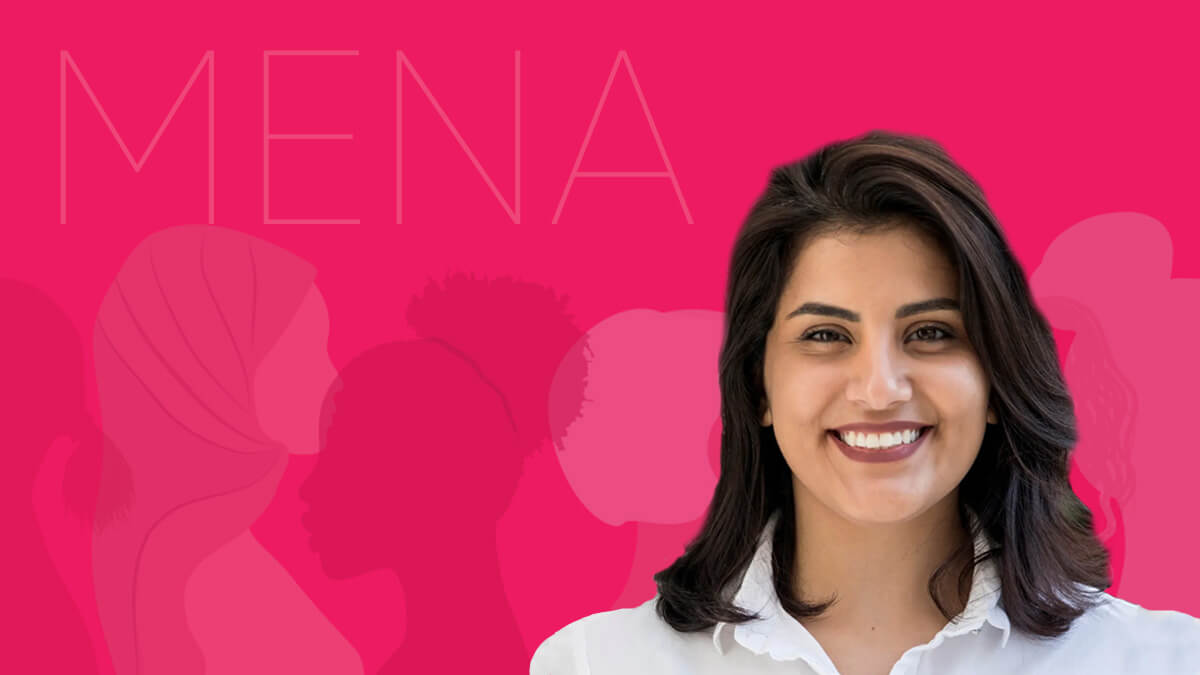Introduction
Authoritarianism is on the rise globally. Historically, women have been at the forefront of movements advocating for democracy and basic human rights. That hasn’t changed. Dictators have responded to these pro-democracy movements with harassment, violence, and arbitrary detention. Nevertheless, women continue to stand up against authoritarian regimes.
To celebrate Women’s History Month, the Human Rights Foundation is highlighting the contributions of women activists and human rights defenders to pro-democracy movements. Throughout this series, we explore the incredible stories of women who took the lead to challenge repression.
Women at the Forefront of Democracy: Combatting Oppressive Laws in Saudi Arabia
As authoritarianism persists throughout the Middle East and North Africa, it’s crucial to recognize the women’s rights activists who have stood up against these dictators despite severe repercussions. In Saudi Arabia, one of the region’s most repressive regimes, advocating for human rights comes with a high risk. Dissent is often met with arbitrary detention and horrific sentences, which is all the more reason to commend those courageously taking a stand.
Saudi women have consistently been catalysts of change, using their voices to shed light on the injustices committed by Mohammed bin Salman’s regime. Prior to MBS’ rule, women bravely led the movement against the Kingdom’s ban on women driving, a restriction that was eventually lifted — in 2018 — thanks to female activism. Today, women continue to advocate against Saudi Arabia’s male guardianship system, under which male family members exercise custodianship over their female counterparts and may interfere in critical decisions such as marriage, divorce, and obtaining a passport.
At the forefront of this advocacy is Loujain Al-Hathloul, a symbol of the resilience and courage of Saudi women’s rights activists.
Al-Hathloul’s activism began in 2009: While living in Canada for her undergraduate education, she used social media to protest the Kingdom’s driving ban. She was arrested in December 2014 on charges related to defying the driving ban and, in May 2018, on unknown charges. While imprisoned, Amnesty International created a petition demanding her release; it garnered over 16,000 signatures.
Al-Hathloul described her time in prison with chilling detail: She was tortured and sexually assaulted by masked men and subjected to caning, electrocution, and waterboarding.
These abuses didn’t deter her from continuing to speak out.
Following her conditional release in February 2021 — which included a five-year travel ban — Al-Hathloul challenged the Kingdom for her unjust arrest and held the United Arab Emirates, which helped Saudi Arabia orchestrate it, responsible.
On Dec. 9, 2021, Al-Hathloul filed a lawsuit against DarkMatter Group, a spying software used by the UAE to hack her iPhone and track her whereabouts. The software detected when she left the UAE, helping lead to her 2018 arrest.
She has also brought attention to the inhuman conditions of Saudi prisons, calling for an investigation into her case. In March 2021, she submitted an objection after the Kingdom’s Supreme Court rejected her appeal for an investigation.
Under the conditions of her release, Al-Hathloul remains barred from traveling, public speaking, and continuing her activism work. Yet, she continues to inspire others to contest the Saudi regime. In fact, her sister, Lina Al-Hathloul, has channeled Loujain’s voice, becoming an ardent global advocate, and shedding light on the injustices Saudi Arabians have faced.
Al-Hathloul is merely one voice in a larger story — the resilience and courage displayed by Saudi women’s rights activists is remarkable. Their stories serve as a reminder of the unrelenting determination of women’s rights activists in the MENA region. In Iran, women are at the forefront of the current revolution, one that has been culminating for years. The work of former OFF speakers Masih Alinejad and Shirin Ebadi in challenging Iran’s compulsory hijab laws and the regime’s infringement of women’s rights demonstrates the power of women’s rights activism. In Sudan, journalist Lubna al-Hussein’s defiance of archaic dress codes revolutionized the interpretation of free expression and initiated a deeper discussion on human rights and censorship. These are only a few examples of many. We must honor the countless women who, against all odds, seek to dismantle oppression and blatant injustices in the region.
Conclusion
Around the world, women have long been at the forefront of movements calling for democracy, freedom, and human rights. From Thailand to Madagascar, Nicaragua to Belarus, and Saudi Arabia to Cuba, women have shown that they are capable of leading the change despite threats and challenges. Undeniably, democracy without women is impossible. We stand in solidarity with the women who are leading these movements globally.
